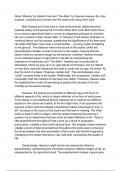Essay
Essay- Farm Work in Poetry by Heaney and Frost
- Course
- Institution
Read “Mowing” by Robert Frost and “The Baler” by Seamus Heaney. By close analysis, compare and contrast how the poets write about farm work. This is an essay which compares and contrasts the work of Frost and Heaney for A Level English Literature. As well as a full essay, I have includ...
[Show more]



